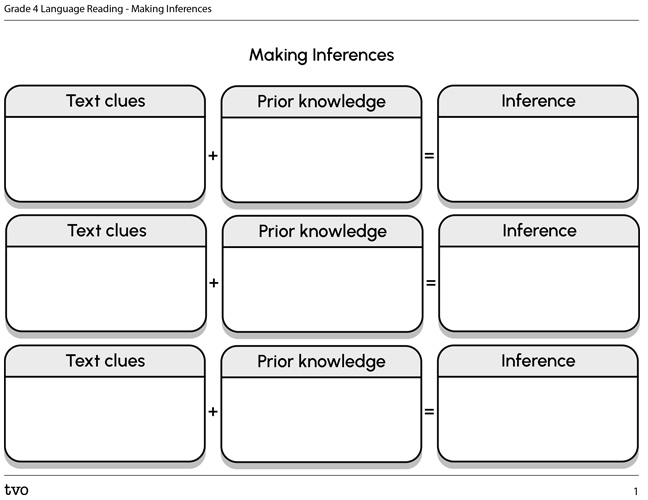Minds On
What am I?
Let's play a game called “What am I?” Use the following clues to guess the mystery person, place, or thing. As you guess, consider:
- What information do you use each time you make a guess?
Record your ideas using a method of your choice.
| Clue | What am I? |
|---|---|
| I am a big animal and I have a furry mane. | |
| I am 30 centimetres in length and I am used to measure things. | |
| I have roots, a stem, and petals. I need the sun to grow. |
Action
What is an inference?
Let’s return to the question in the Minds On: What information do you use each time you make a guess?
You probably used a combination of your own experiences or background knowledge along with other words in the sentence to solve each clue. This is called making inferences.
The combination of using text clues and background knowledge is at the core of making inferences.
For example: I am a big animal and I have a furry mane.
The keywords here are “big animal” and “furry mane.”
While “big animal” probably got you thinking about blue whales, elephants, giraffes, and bears, lions are the only big animals that have a lot of bushy hair around their face and neck called a mane.
Clues from the text + background knowledge = Inference

Why do we make inferences?
Making inferences is a reading comprehension strategy that we can use to make conclusions about a text’s meaning, but also its purpose. This helps us to form a deeper understanding of a text.
Let’s practice making some more inferences.
This time, select a text of fiction text of your choice. Practice making inferences before, during, and after reading using a combination of clues from the text and your own experiences and background knowledge.
Use the Making Inferences template to record your inferences or another method of your choice.
| Text Clues | Prior knowledge | Inference |
|---|---|---|
Consolidation
Make inferences with a different type of text
Journal or diary
When a person writes a diary or a journal, they are sharing their ideas. This type of writing provides the reader with first person point of view. Is it easier or harder to make inferences from a diary or journal?
Questions to consider:
- How does a diary or journal that gives first-person record of events, thoughts, and feelings make it different to infer?
- Are there personal connections that you can make to the events in the text? Do they help you infer?
Record your responses using a method of your choice.
Reflection
As you read through these descriptions, which sentence best describes how you are feeling about your understanding of this learning activity? Press the button that is beside this sentence.
I feel...
Now, record your ideas using a voice recorder, speech-to-text, or writing tool.
